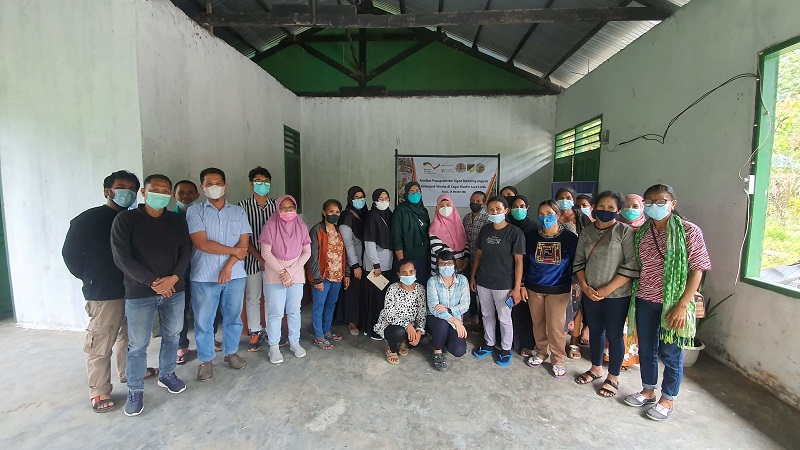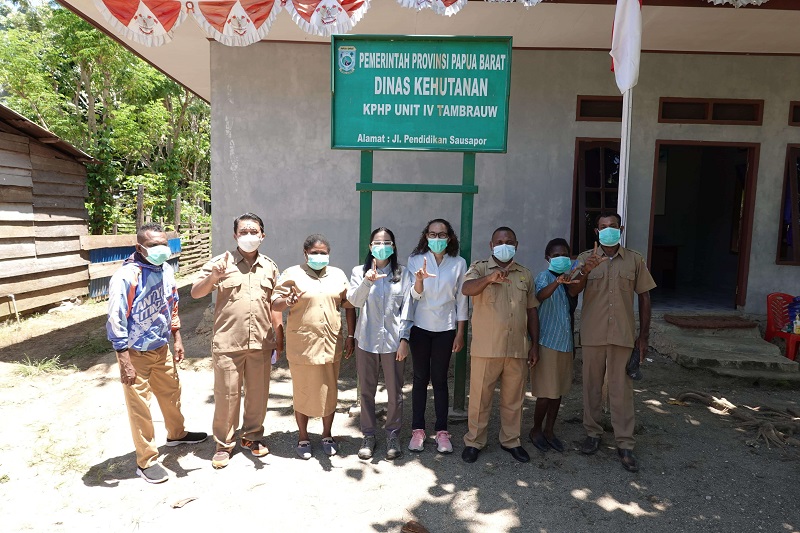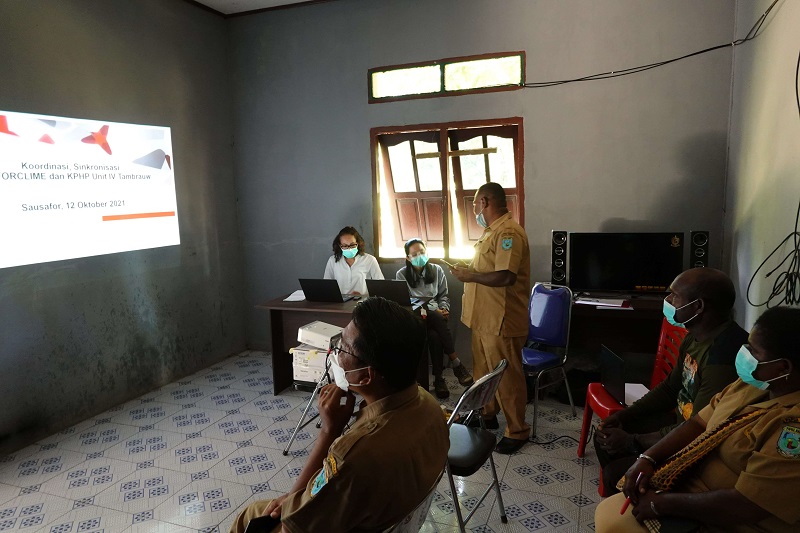FORCLIME
Forests and Climate Change ProgrammeTechnical Cooperation (TC Module)

Select your language

The Lore Lindu Biosphere Reserve (LLBR) area is rich in a diversity of flora and fauna, including orchids. It is estimated that some 100 species of orchid can be found in the LLBR, some of which are endemic species. Communities around LLBR often cultivate orchids as an alternative source of income due to the high prices and strong demand associated with this iconic flower.
Three villages around the LLBR are actively cultivating orchids, specifically the villages of Karunia, Rejeki and Bahagia, which are located in the district of Palolo in Sigi Regency. In order to improve the sustainability of community businesses and ensure the sustainability of CBLL forest management, FORCLIME, in collaboration with the Faculty of Forestry at Tadulako University and the Center for Integrated Business Services for Cooperatives, Micro-, Small- and Medium-Scale Enterprises (PLUT KUMKM) in the province of Central Sulawesi, recently organised training relating to orchid propagation and digital marketing to an orchid-related women’s group in the three villages in question.
The training session was held on 24 October2021 in Karunia Village and was attended by 21 participants. In terms of orchid propagation, the participants received training in orchid propagation techniques and the conditions required for orchid growth, including climate, media, planting techniques, fertilization and storage. In terms of digital marketing, the material provided related to digital marketing strategies, the optimization of digital marketing and strategies aimed at determining suitable sale prices for orchids.
Suniati, one of the training participants from the village of Bahagia, conveyed her impressions of the training, stating that, ‘The most important thing that I learned was how to promote products online. However, training sessions such as this should be conducted in locations with decent Internet connectivity so that we can practice what we learn directly.’
For more information, please contact:
Ismet Khaeruddin, Senior Advisor for the Biodiversity Focal Point for the KFW Forest Program 3 and Provincial Coordinator for Central Sulawesi
Fikty Aprilinayati, Adviser for Sustainable Forest Management and Biosphere Reserve Management

In line with FORCLIME's mandate to support social forestry within Tanah Papua, FORCLIME has initiated activity aimed at identifying potential pilot villages through the Production Forest Management Unit (KPHP) at Tambrauw. Based on discussions with the Forestry Service of West Papua Province and KPHP Tambrauw, three recommendations for prospective joint pilot villages were tabled, namely Orwen Village in Distrik Kwoor, Emmaus Village in Distrik Sausapor and Bikar Village in Distrik Bikar. The FORCLIME team, working in conjunction with representatives from KPHP Tambrauw, conducted visits to these villages in order to gather information on their geophysical conditions, community institutions, potential Non-Timber Forest Products (NTFPs) and potential for assistance, as well as the locations of and access to the three villages. The field visits were held from 13 - 15 October 2021.
During the visits, the FORCLIME and KPHP Tambrauw teams met and interacted with local communities, which welcomed the team with open arms. Members of the Abun tribe live in the three villages and already have a recognized customary institution, namely the Abun Tribe Traditional Community Institution (Lembaga Masyarakat Adat Suku Abun - LEMASA). In general, the potential NTFPs that the three villages produce comprise lawang trees, candlenut, rattan, orchids, deer, agarwood and masoi. These NTFPs are managed by the community on a collective basis by approximately 12 - 27 persons and the management of the NTFPs is carried out in line with the customary rights of each clan. Various local wisdom relates to the management of NTFPs, particularly in relation to lawang oil, the managers of which must not have any bad intentions and must not have had any contact with women. In addition, hunting activity must be undertaken through the use of traditional tools. There is also a sacred forest here, specifically a forest that can only be accessed by clans who possess customary land rights. Moreover, the forest products that are produced within this forest can only be utilized by certain persons.
In the wake of these visits, the FORCLIME team and KPHP Tambrauw will consult with the West Papua Provincial Forestry Service in order to determine a target village and to coordinate regarding potential within in the village. The team is also planning to hold a number of events in order to disseminate information and will request permission from LEMASA prior to undertaking any such activities.
For more information, please contact:
Nita Yohana, Adviser for Sustainable Forest Management and Coordinator for West Papua Province
Melanesia Brigite Boseren, Junior Adviser for Rural Livelihood, Forest Management and Conservation
Mohammad Sidiq, Strategic Area Manager for Sustainable Forest Management and Coordinator for Papua and West Papua Provinces

With the goal of synergizing the implementation of their 2021 programmes, FORCLIME and the Production Forest Management Unit (KPHP) at Tambrauw held a meeting on Tuesday, 12 October 2021 at the KPHP Tambrauw Office, Sausapor, West Papua. The meeting was opened by the Head of KPHP Tambrauw, Petrus Freddy Tawer. During the meeting, the discussions tackled the potential for a synchronised work plan between FORCLIME and KPHP Tambrauw, including the preparation of a Long-Term Forest Management Plan (RPHJP) and capacity development in relation to KPHP Tambrauw’s human resources.
In addition, the discussions also addressed preparations for a field visit to potential FORCLIME and KPHP Tambrauw joint pilot villages. Three potential villages have been proposed, specifically Orwem Village in Distrik Kwoor, Emmaus Village in Distrik Sausapor and Bikar Village in Distrik Bikar. The field visits commenced the following day and ran from 13 - 15 October 2021. These visits were undertaken by representatives of both FORCLIME and KPHP Tambrauw.
The Head of KPHP Tambrauw expressed his appreciation for FORCLIME’s visit to Tambrauw and its efforts to synchronize its work plan and identify pilot villages on a joint basis. ‘The management and development of KPHP requires support from various parties and we are grateful for the cooperation with FORCLIME. As a local resident of Tambrauw, I hope that the huge potential for Non-Timber Forest Products (NTFPs) in Tambrauw can be managed in synergy with the Forestry Service, KPHP and the community’, explained Mr. Petrus Freddy Tawer, Head of KPHP Tambrauw.
For more information, please contact:
Nita Yohana, Adviser for Sustainable Forest Management and Coordinator for West Papua Province
Melanesia Brigite Boseren, Junior Adviser for Rural Livelihood, Forest Management and Conservation
Mohammad Sidiq, Strategic Area Manager for Sustainable Forest Management and Coordinator for Papua and West Papua Provinces
 |
Supported By: |
  |